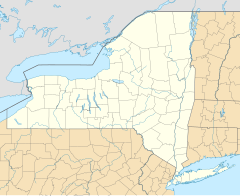Niagara Reservation
| Niagara Falls State Park | |
|---|---|

Niagara Falls State Park's overlook of the American Falls, with the Horseshoe Falls in the distance
|
|
| Type | State park |
| Location | Prospect Street & Old Falls Street Niagara Falls, New York |
| Coordinates | 43°05′N 79°04′W / 43.08°N 79.07°WCoordinates: 43°05′N 79°04′W / 43.08°N 79.07°W |
| Area | 221 acres (0.89 km2) |
| Created | 1885 |
| Operated by | New York State Office of Parks, Recreation and Historic Preservation |
| Visitors | 9,011,709 (in 2014) |
| Open | All year |
| Website | |
|
Niagara Reservation
|
|
| Location | Niagara Falls, New York |
| Built | 1885 |
| NRHP Reference # | 66000555 |
| Significant dates | |
| Added to NRHP | October 15, 1966 |
| Designated NHL | May 23, 1963 |
Niagara Falls State Park is located in the City of Niagara Falls in Niagara County, New York. The park, recognized as the oldest state park in the United States, contains the American Falls, the Bridal Veil Falls, and a portion of the Canadian Falls, also known as the Horseshoe Falls.
Prior to being protected as a state reservation, the lands surrounding Niagara Falls on the American side were largely controlled by private interests, and public access to the falls was limited. An early champion of the falls' surroundings was landscape architect Frederick Law Olmsted, who began advocating for the preservation of the falls in the 1860s. In 1879, at the behest of the New York State Legislature, Olmsted and State Surveyor James T. Gardner helped prepare a special report on the falls' conditions, which argued for increased public access to the falls and recommended that the state purchase lands for that purpose. The report was followed by a publicity and petitioning campaign that helped bring the issue to the public's attention.
Olmsted and others formed the Niagara Falls Association in 1883, a group that aimed to lobby New York to acquire and protect the falls from private exploitation. Their efforts succeeded later that year when, on April 30, 1883, a bill authorizing the "selection, location and appropriation of certain lands in the village of Niagara Falls for a state reservation" was signed into law by then-governor Grover Cleveland. The act led to the establishment of the Niagara Reservation in 1885. New York State Assemblyman Thomas Vincent Welch figured prominently in getting the bill signed, and served as the first Superintendent of the Park for 18 years from its inception until 1903.
Niagara Falls State Park is claimed to be the oldest continuously-operating state park in the United States and the first established via eminent domain.
...
Wikipedia


